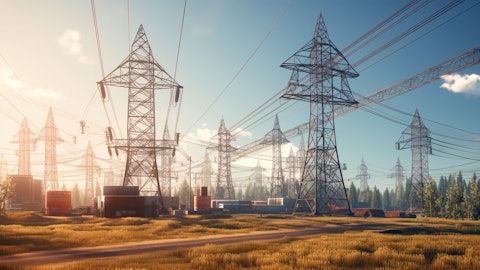Anthony Crowdell: Hey. Good morning team. I hope all is well. I guess just quickly, if I could get Rod busy here. Just on SERI, Rod, I know there is – you are working with the Louisiana Public Service Commission on maybe settling there. Separately, there is the formula rate plan issue. Is there anything that prevents both of those being settled together, meaning one is that FERC issue and one may be more of a state issue?
Rod West: Short answer is no. We are pursuing our efforts there with stakeholders on selling both and the interest being avoiding any litigation associated with either. So, short answer is, no, there is nothing preventing us from pursuing a settlement on both issues regardless of Federal versus State jurisdiction.
Anthony Crowdell: Great. And then just an easy one, I guess, Drew, on the gas sale update. I know it’s a very long window for approval. Just any update or timing or procedural schedule you can provide us?
Drew Marsh: So, the gas LDC, as I mentioned, is on schedule. We have – there is more details in the appendix. And so I think that at the LPSC, it’s moving on quite quickly. The timeline is a little longer in New Orleans. But at this point, we don’t see anything that’s impeding the progress and the ultimate completion of the transaction. So, we are firmly confident there is a possibility that it could move up a little bit. But at this point, we are sticking with our third quarter 2025 timeline.
Anthony Crowdell: Great. Thanks for taking my questions.
Drew Marsh: Thank you.
Operator: Our next question comes from the line of Steve Fleishman from Wolfe Research. Your line is now open.
Steve Fleishman: Yes. Hi. Good morning. Thanks. Most of my questions were answered. Just wanted to get a little more information on this Waterford trip, do you expect that you will have the new transformer by kind of summertime?
Drew Marsh: Probably not. That’s a new transformer. And as I know you are aware, there is a backlog for large transformers like that. And we don’t have one of that size as a spare. So, we do have the interim transformer ready to go, and it should be ready by summertime. That gets us back to about 90%. And so the plant should be online this summer, but we won’t have full deliverability out of the plant that we get a new transformer in place.
Steve Fleishman: Okay. Alright. But you can run 90% just with the spare. So, it’s kind of most of the way, so…
Drew Marsh: Yes. That’s correct.
Steve Fleishman: Okay. And then maybe just on MISO transmission. When are we going to get – I know they are going through the different tranches, like when are we going to get to the Entergy zone area for MISO transmission?
Drew Marsh: I believe that they are expecting to put something out late this year, but the timelines have moved around a little bit for them, but I think that was the previous expectation. Just to be clear, you are talking about the long-term planning piece of it, right?
Steve Fleishman: That’s right.
Drew Marsh: Yes. I think as you know, they have been in MISO North for a while working on stuff. And I do believe that they plan to put out some expectations later this year.
Steve Fleishman: Okay. And then I guess just on the Cogent sales, just is this – are you expecting industrial growth for the year? Cogent sales, if I recall, are pretty low margin.
Kimberly Fontan: That’s absolutely correct, Steve. And the Cogent sales were for the quarter, but that’s really a volume difference, slight EPS difference. But as we discussed, the incremental industrial sales certainly support that, helping us achieve our objectives at the end of the year.
Steve Fleishman: Okay. Thank you.
Drew Marsh: Thank you.
Operator: Our next question comes from the line of Angie Storozynski from Seaport Research Partners. Your line is now open.
Angie Storozynski: Hi. Thank you. So, two questions, first, as you see this data center load materializing in your service territory, is there any discussion about potential changes in like T&D tariffs that these big users would be paying? I am mostly trying to see if there is any way to shield residential customers from payments for any sort of T&D upgrades that will be needed to accommodate this load.
Kimberly Fontan: Good morning Angie. Yes, when you think about data centers, they certainly are requiring infrastructure to support them. And so we are ensuring that the pricing of those customers price in a way that support those for customer coming, but also support the rest of our customers in the infrastructure build that’s needed. When you referenced Mississippi specifically, we worked closely with the legislature to ensure that we had the ability to add the infrastructure that we needed, but also that we protected all of our other customers through the contract. So, it was a benefit both to add the customer to the system, but also to the State of Mississippi and all of our other customers. And I would think about it the same way for future data centers that add to our service territory.
Angie Storozynski: Good. And speaking of Mississippi, and I am just thinking about SERI, all of these issues that are related to the Grand Gulf nuclear plant. I mean as you are basically trying to finish all of the litigations associated with that plant, is there – I mean would you, for example, consider signing like a long-term contract with a data center instead of having the sort of disputes on the regulated level just to make this asset dedicated to an industrial or commercial user as opposed to having it, again, it seems to have led to a number of regulatory disputes in the past.
Drew Marsh: Yes, that’s a good question, Angie. We are thinking about various potential solutions there. Right now, the output of those facilities are contracted for the life of the unit to each of the operating companies that participate. So, I don’t think that there is any room for data center pieces, but we are looking at all other alternatives in order to try to mitigate that future potential litigation risk, that is definitely on our radar screen, although we don’t have anything to discuss about that right now.
Angie Storozynski: Got it. Thank you.
Drew Marsh: Thank you.
Operator: Our next question comes from the line of Ryan Levine from Citi. Your line is now open.




